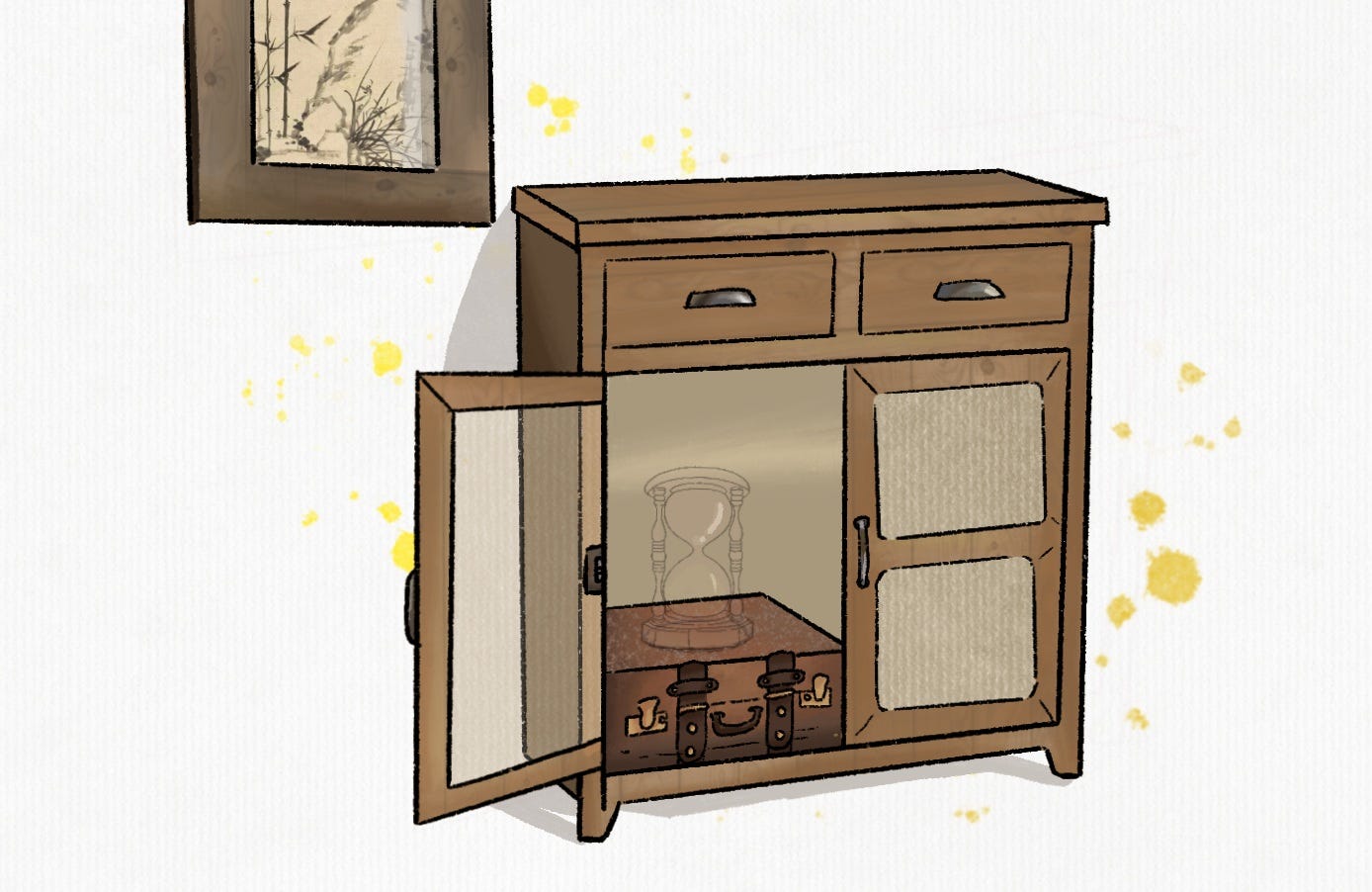枝丫2: 03: 第三章: 沙漏不见了
Zhang Laoban discovers his sand timer is missing.
Twig 枝丫 Zhīyā is a fantasy series written in Simplified Chinese characters for intermediate level adult readers.
Reviewing the word list prior to reading the chapter may help with enjoyment and comprehension.
张老板又走进他的胡同书店。把手伸进裤口袋里,从里面拿出一串钥匙,从这串钥匙里找出前门的钥匙。小心地把钥匙插进锁孔,关上前门,并锁住前门,然后,把门闩上。
像张老板一贯的做法一样,他把门把手推了又拉,拉了又推,确定锁住了。然后,他走向后屋去准备定期会议。
到了后屋,张老板从这串钥匙里找出后屋门的钥匙。他刚要把钥匙插进锁孔,却发现门没有锁,已经开了。
哦,我太老了,张老板想。我忘了锁门。
张老板忙着准备后屋会议。他在一把椅子上放了一个坐垫,让他的老朋友老李的老骨头坐着更舒服一些。很快,他觉得他也需要为自己更老的骨头买一个坐垫。
张老板胸口里面剩下的树说:你太老了。你太老了记不住。你不能领导了。你连门锁没锁都不记得。
张老板没管树,而是走向了柜子。
在后屋里,在新书箱子的上方,墙上挂着一幅画,画的旁边还有一个柜子。在他的柜子里,张老板把东西放得很有条理:艺术用品,一盒子的回忆和一个沙漏。
沙漏是用珍贵的花梨木头做的。它来自他妻子的家庭,一代一代地传下来。每次张老板走近柜子时,都期待着打开柜子,看到沙漏熟悉的曲线。虽然他的妻子已经去世了,但是,当他看到沙漏时,他不知为何感觉她的心和他的心还有联系。
像张老板一贯的做法一样,每次开会以前,总是自信地伸出手抓住柜子把手,打开柜子,并把手伸进柜子里去拿沙漏。突然,他的手停在了半空中。
沙漏不见了。
很久以后,张老板常常一遍一遍地在脑子里回忆起这个时刻,像慢动作一样重放以前的事情:看着太阳开始落山,关上并锁住书店前门,发现后屋门已经开了,把手伸进柜子里,发现沙漏不见了。他一遍一遍地问自己:我漏掉了什么?什么?什么?
当树说他太老了记不住了,张老板认为树说得不对。张老板忘不了门里冷,门外热。他觉得门里和门外就像好消息和坏消息的区别一样。
Word List
漏 lòu to leak, to omit, to miss
沙漏 shālòu sand timer, hourglass
伸进 shēnjìn reach into
裤口袋 kùkǒudài pants pocket
拿出 náchū take out
串 chuàn a bunch, a string; classifier for keys or things in a string; string together, connect; string of things, skewer (串 chuān to pierce or thread through: 串针 chuān zhēn to thread a needle)
钥匙 yàoshi key
一串钥匙 yíchuàn yàoshi a bunch of keys
插 chā insert
插进 chājìn insert into
锁 suǒ lock
孔 kǒng hole
锁孔 suǒkǒng keyhole
住 zhù live; after a verb, to indicate something is held, fixed, or firmly in place
锁住 suǒzhù lock
闩 shuān bolt, latch
把门闩上 bǎ mén shuān shàng bolt the door
管 guǎn to manage, to take care of, to control, to be responsible for
一贯的 yíguàn de usual
做法 zuòfǎ way of doing
一样 yíyàng same
像张老板一贯的做法一样 xiàng zhāng lǎobǎn yíguàn de zuòfǎ yíyàng just like Zhang Laoban always does; in Zhang Laoban’s usual way
门把手 ménbǎshǒu door handle
推 tuī push
拉 lā pull
确 què true, certain, definite
定 dìng set, fix, decide
确定 quèdìng to confirm, to make sure, to determine; literal: make certain and fixed
锁住了 suǒzhù le was locked
垫 diàn cushion, pad
坐垫 zuòdiàn seat cushion
骨 gǔ bone
骨头 gǔtou bone (in the body or food)
剩 shèng remain, be left over
领 lǐng lead, receive
导 dǎo guide
领导 lǐngdǎo lead, be a leader, offer leadership
没管 méi guǎn didn’t pay attention to, ignored
箱子 xiāngzi box
墙 qiáng wall
挂 guà hang
幅 fú measure word for paintings
墙上挂着一幅画 qiáng shàng guàzhe yī fú huà on the wall hangs a painting
柜子 guìzi cabinet
艺术用品 yìshù yòngpǐn art supplies
盒子 hézi
回忆 huíyì v. to recall, to look back on; n. a recollection, a memory
条理 tiáolǐ order
珍贵的花梨木头 zhēnguì de huālí mùtou precious rosewood
一代一代地传下来 yīdài yīdài de chuán xiàlái passed down from generation to generation
期望 qīwàng anticipates, expects
熟 shú cooked, ripe, familiar
悉 xī to know in detail; to be aware
曲 qū bent, curved
线 xiàn thread, line
熟悉的曲线 shúxī de qūxiàn familiar curve
遍 biàn a time; one complete time through something
一遍一遍地 yībiàn yībiàn de repeatedly, over and over again
回想起 huíxiǎng qǐ recall
时刻 shíkè moment in time
慢动 màn dòng slow motion
重放 chóng fàng replay
掉 diào result complement indicating something is lost, dropped, or removed
漏掉 lòu diào miss; let something leak/drop away, e. g. to omit, miss, accidentally leave out (沙漏 shālòu sand timer, hourglass)
忘不了 wàng bù liǎo can’t forget
区别 qūbié difference
Notes
1. A sand timer is mentioned in 《枝丫1》 Chapter 22 and 《枝丫1》Chapter 29. A sand timer is featured in 微故事:一个沙漏.
2. Here are some notes about expressing “remember” and “memory” from Mary, our editor:
记忆 jìyì n. a memory; memory as mental storage or capacity to remember
一段记忆像火一样 yīduàn jìyì xiàng huǒ yīyàng a memory flared like fire
回忆 huíyì v. to recall purposefully, to look back on; n. a recollection, a memory; talking about the act of remembering or specific memories
回忆 as a verb: 一遍一遍地在脑子里回忆 yībiàn yī biàndì zài nǎozǐ lǐ huíyì again and again recalled this moment in his mind
回忆 as a noun: 一盒子的回忆 yī hézǐ de huíyì a box of memories
回想起 huí xiǎng qǐ verb phrase; suddenly recall, remember back
回想起这个时刻 huíxiǎng qǐ zhège shíkè recall the moment
3. As suggested by Hu (2013), I try to offer us - intermediate-level learners - some of the 3 to 17 exposures to new words in different contexts needed to acquire new vocabulary.
According to Hong et al. (2017), adult language learners might optimize acquisition by prioritizing procedural memory (learning a process so well that it becomes automatic) over declarative memory (the conscious recall of facts and information). Examples of procedures are greetings and introductions when meeting someone new or ordering food at a restaurant.
Applying both of these findings from research, I explored vocabulary related to opening and closing, pushing and pulling, and procedures using keys and locks.
Here’s the key and lock list without extra words:
串 chuàn a bunch; classifier for keys or things in a string)
钥匙 yàoshi key
一串钥匙 yíchuàn yàoshi a bunch of keys
插 chā insert
插进 chājìn insert into
锁 suǒ lock
孔 kǒng hole
锁孔 suǒkǒng keyhole
住 zhù live; after a verb, to indicate something is held, fixed, or firmly in place
锁住 suǒzhù lock
闩 shuān bolt, latch
把门闩上 bǎ mén shuān shàng bolt the door
门把手 ménbǎshǒu door handle
更多
枝丫1:《枝丫》第一部
枝丫1:Table of contents | 枝丫1:Chapter 1 | Complete 枝丫1 story, just 汉字
枝丫2:《枝丫》第二部
枝丫2:Table of contents | 枝丫2:Chapter 1 | 枝丫2 so far, just 汉字
微故事 Wēigùshì, a series of occasional vignettes featuring objects in the 胡同 and in the lives of 枝丫’s denizens.
Word lists for review in Hack Chinese.
Main page: Twig 枝丫: A fantasy novel


